

Functionalism, Marxist Theory, Power Elite Theory, & Symbolic Interactionism. The Public Intellectual. Within the last few decades, the emergence of public intellectuals as important cultural and social critics has raised fundamental questions not only about the social function of academics, but also about the connection between higher education and public life, between academic work and the major issues shaping the broader society.

Truthout's Public Intellectual Project will provide progressive academics with an opportunity to address a number of important social issues in a language that is both rigorous and accessible. All too often, academics produce work that is either too abstract for a generally informed public, or they separate their scholarship from the myriad of issues and contemporary problems that shape everyday life in the United States and abroad. Articles by Henry A. Giroux Articles by (or About) Other Authors in the Public Intellectual Project Seth Adler Ian Angus Stanley Aronowitz Salvatore Babones Zygmunt Bauman Carol Becker Dr. Megan Boler Noam Chomsky David L. Simon Dawes. Dead Sociologists Index. Marxists Internet Archive.
Durkheim Home Page. Max Weber. 1.

Life and Career Karl Emil Maximilian Weber (1864–1920) was born in the Prussian city of Erfurt to a family of notable heritage. DuBoisopedia [DuBoisopedia ] W.E.B. Du Bois. The Forms of Capital by Pierre Bourdieu 1986. Pierre Bourdieu 1986.
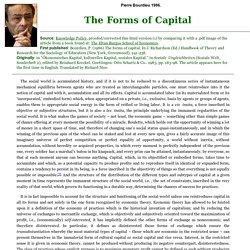
Source: Knowledge Policy, proofed/corrected this html version (1) by comparing it with a .pdf image of the article from a book found at: The Eltan Burgos School of Economics.First published: Bourdieu, P. (1986) The forms of capital. In J. Richardson (Ed.) Sociology is a martial art. Pierre Bourdieu. SocioSite. C. Wright Mills' Sociology. Patricia Hill Collins, Black Feminist Thought in the Matrix of Domination.
Documents menu Black feminist thought demonstrates Black women's emerging power as agents of knowledge.
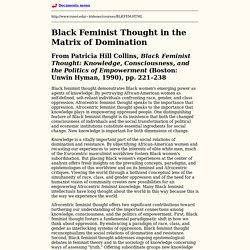
By portraying African-American women as self-defined, selt-reliant individuals confronting race, gender, and class oppression, Afrocentric feminist thought speaks to the importance that oppression, Afrocentric feminist thought speaks to the importance that knowledge plays in empowering oppressed people. One distinguishing feature of Black feminist thought is its insistence that both the changed consciousness of individuals and the social transformation of political and economic institutions constitute essential ingredients for social change. New knowledge is important for both dimensions ot change. The Foucault Pages at CSUN. Michel Foucault. 1.

Biographical Sketch Foucault was born in Poitiers, France, on October 15, 1926. His student years seem to have been psychologically tormented but were intellectually brilliant. He became academically established during the 1960s, when he held a series of positions at French universities, before his election in 1969 to the ultra-prestigious Collège de France, where he was Professor of the History of Systems of Thought until his death. From the 1970s on, Foucault was very active politically.
It can be difficult to think of Foucault as a philosopher. 2. Edward Said. Trifunctional hypothesis. This part of a 12th-century Swedish tapestry has been interpreted to show, from left to right, the one-eyed Odin, the hammer-wielding Thor and Freyr holding up wheat.
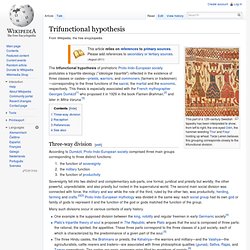
Terje Leiren believes this grouping corresponds closely to the trifunctional division. Science overturns view of humans as naturally ‘nasty’ By Agence France-PresseMonday, February 20, 2012 20:50 EDT VANCOUVER, Canada — Biological research increasingly debunks the view of humanity as competitive, aggressive and brutish, a leading specialist in primate behavior told a major science conference.

“Humans have a lot of pro-social tendencies,” Frans de Waal, a biologist at Emory University in Atlanta, told the annual meeting of the American Association for the Advancement of Science. New research on higher animals from primates and elephants to mice shows there is a biological basis for behavior such as cooperation, said de Waal, author of “The Age of Empathy: Nature’s Lessons for a Kinder Society.” Until just 12 years ago, the common view among scientists was that humans were “nasty” at the core but had developed a veneer of morality — albeit a thin one, de Waal told scientists and journalists from some 50 countries. “Human morality is unthinkable without empathy.” Copyright 2012 The Raw Story. Great Diagrams in Anthropology , Linguistics, and Social Theory. 2606027019_676d182260.jpg (Image JPEG, 500x366 pixels)
Goffman. Sociological Theory. Introduction and Conclusion. Who Rules America? Power, Politics, & Social Change. By G.

William Domhoff Welcome to WhoRulesAmerica.net, a site about how power is distributed and wielded in the United States. It both builds upon and greatly supplements the book Who Rules America? The Nature of Sociological Theory. Chapter 03 - Social theories. Making Sense of Abstract Theories Sociological theories are the core and underlying strength of the discipline.
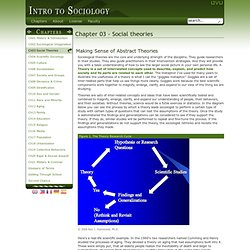
They guide researchers in their studies. They also guide practitioners in their intervention strategies. And they will provide you with a basic understanding of how to see the larger social picture in your own personal life. A Theory is a set of interrelated concepts used to describe, explain, and predict how society and its parts are related to each other. What is Sociological Theory? What is Sociological Theory?
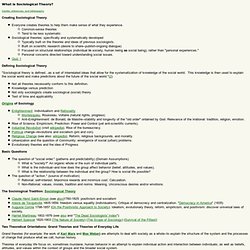
Credits, references, and bibliography Creating Sociological Theory Everyone creates theories to help them make sense of what they experience. Common-sense theories Tend to be less systematic Sociological theories: specifically and systematically developed Typically built on the theories and ideas of previous sociologists. Built on scientific research (desire to share--publish-ongoing dialogue) Focused on structural relationships (individual in society, human being as social being), rather than "personal experiences. " FAMOUS SOCIOLOGISTS. © 1996-2014 AByT! All Rights Reserved Jane Addams was one of the vice presidents of the Chicago Liberty Meeting that led to the formation of the Central Anti-Imperialist League in Chicago. Introduction to Sociology/Sociological Theory. Introduction[edit] Sociologists develop theories to explain social phenomena. Chomsky.info : The Noam Chomsky Website.
The Anarchist Library. Sociological Theories To Explain Deviance. (Note: the title of "labeling theory" can be a bit misleading, so be careful here. Labeling theorists do not like labels, okay? But they say that labeling is a social fact, especially when we talk about social institutions like law enforcement, social service agencies, and mental health facilities.
So therefore they study the power of labels in our society). Also note that this theory combines two theoretical perspectives--conflict theory and symbolic interactionism. You should be able to explain what that last sentence means, okay? -- the theory explains deviance as a social process whereby some people are able to define others as deviant. Chapter 17 Chapter Summary. The concept of modern social theory presents the possibility of a postmodern social theory. Indeed, postmodernism has had wide-ranging effects on a number of disciplines, including sociology. Because of the multidisciplinary nature of postmodernism, it is necessary to think of postmodern social theory rather than postmodern sociological theory, with the basic distinction resting on the various sources of input in social theory.
Structuralism Structuralism emerged from a reaction against the humanism of Jean-Paul Sartre's (1905-1980) existentialism. Sartre assailed the idea of structures that overly determine the behavior of individuals, of having actors without agency. Structuralism also influenced anthropology and Marxism. Poststructuralism. Sociological Theory. Packer - Two Models of the Criminal Process.